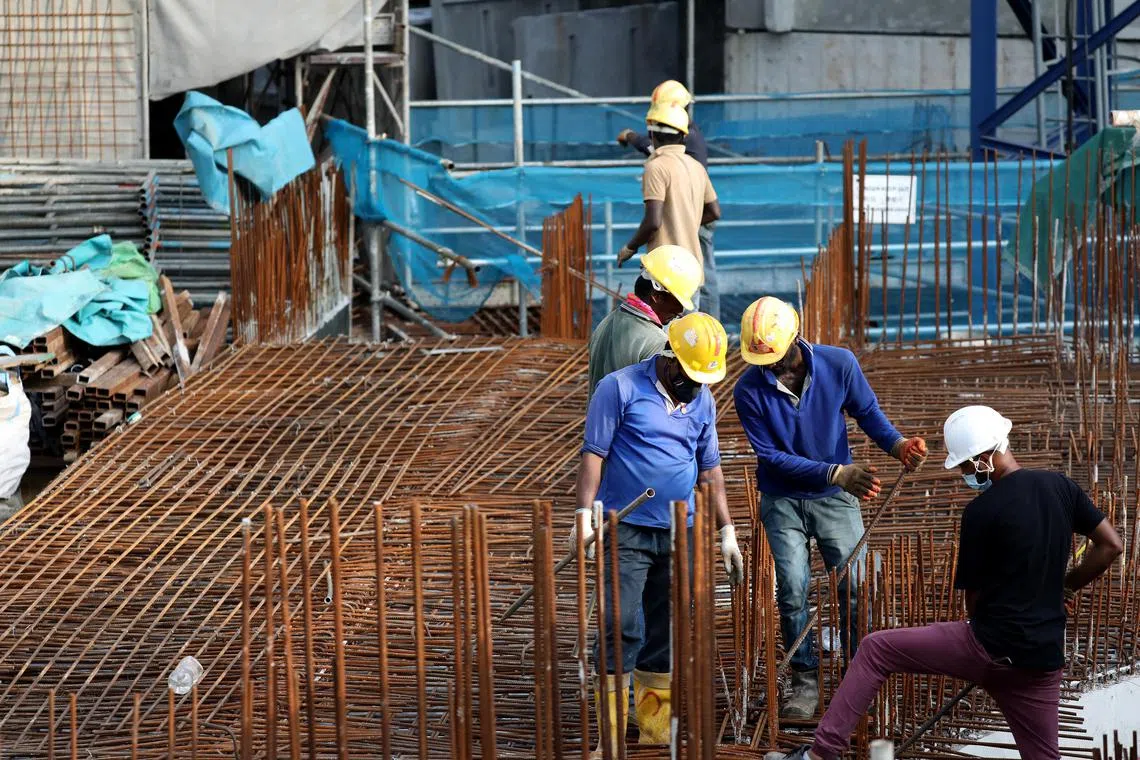Blue-collar workers may have internalised society’s lower valuation of their work: Expert
Sign up now: Get ST's newsletters delivered to your inbox

Results from a survey by IPS showed that blue-collar workers may have internalised a lower valuation in how they perceive their own careers.
PHOTO: LIANHE ZAOBAO
SINGAPORE – A survey by the Institute of Policy Studies (IPS) has found that blue-collar and semi-professional workers are less likely to believe they have meaningful careers and make a positive difference in the world.
Only about half of clerical, sales and service workers, as well as production and transport operators, cleaners and labourers, believe this, compared with six in 10 professionals, managers, executives and technicians (PMETs).
Moreover, the percentage of workers in the first two groups who said it was not at all true or only slightly true that they have meaningful careers is double that of PMETs in the poll of over 1,000 working Singaporeans and permanent residents.
This suggests that blue-collar workers are less valued by society, and they have internalised this lower valuation in how they see their own careers, said organisational psychologist Brandon Koh, who was not involved in the study.
The study was conducted in October and released on Monday
It was led by IPS senior research fellows Laurel Teo and Chew Han Ei.
“Without targeted forms of recognition, people may turn to their comparative salaries to appraise their value,” said Dr Koh, a Singapore University of Social Sciences lecturer. “It can be therefore important to highlight what vocational workers do, how they do it differently, and the positive impact it contributes to society.”
“This is even more important for preventive and safety roles, where a job well done ensures its invisibility to the people it benefits,” he added, citing railway engineers as an example.
Dr Chew from IPS said the findings may indicate Singapore society does not sufficiently value hands-on and care work, echoing a point Deputy Prime Minister Lawrence Wong made in an October 2022 speech.
“And sometimes it reflects in the opinions of workers in these professions – (that) because their work is not valued by society as much, it may seem like their careers are not as meaningful,” said Dr Chew.
Singapore Management University sociologist Paulin Straughan said that societies tend to valorise professional work as they progress, but the Covid-19 pandemic has fleshed out how essential hands-on and care work is.
“We need to re-toggle (perceptions), because how can it be that your essential core is indispensable during a pandemic, and yet, in terms of remuneration, we do not demonstrate that,” said Professor Straughan. She added that an increased emphasis on advocacy, sustainability and mental health, particularly among youth, is cause for optimism that the gap would narrow in the next few years.
PMETs, who are usually mid-level executives directly involved in daily business operations, business strategy and planning, may find their jobs more meaningful due to a greater sense of involvement and execution, said Ms Betul Genc, Singapore country manager at recruitment firm Adecco. The firm handles recruitment of both rank-and-file workers and PMETs.
“Blue-collar roles tend to require more manual work, and some may be on a part-time or contract work-basis, where they are not as involved in business strategy,” said Ms Genc.
This underscores the challenge of communicating to these workers a sense of meaning and potential to make a positive difference, to forge a sense of belonging in the organisation.
But she added: “In 2023, there is still high demand for blue-collar workers within sectors such as e-commerce and retail, where we have observed that students and retirees are open to such roles due to work flexibility, opportunity to socialise and pick up some soft skills such as teamwork and communication.”


